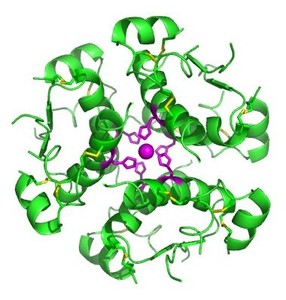US pharma giant Merck announced on 5 August 2016 that its regulatory submission for its proposed follow-on insulin glargine product (MK-1293) had been accepted by the US Food and Drug Administration (FDA).
FDA accepts application for Merck’s follow-on insulin glargine
Biosimilars/News
|
Posted 02/09/2016
 0
Post your comment
0
Post your comment

The application for the investigational follow-on biological insulin glargine candidate was submitted as a new drug application (NDA) via the 505(b)(2) regulatory pathway, which allows FDA to reference previous findings of safety and efficacy for an already-approved product (Lantus), in addition to reviewing findings from studies of MK-1293.
Insulin glargine is a long-acting basal insulin analogue, given once daily to help control the blood sugar level of those with diabetes. It consists of microcrystals that slowly release insulin, giving a long duration of action of 18 to 26 hours. Insulin glargine is indicated for the treatment of diabetes mellitus in adults, adolescents and children aged two years and above.
The product is a proposed follow-on product to Sanofi’s Lantus (insulin glargine), which had worldwide sales of US$6.4 billion in 2015. The patents on Lantus expired in 2014 in both Europe and the US [1]. Eli Lilly/Boehringer Ingelheim have already had a follow-on insulin glargine product, Basaglar, approved in the US in August 2014 [2].
The application is based on data from phase I studies assessing its pharmacokinetic and pharmacodynamic properties, as well as results of two phase III studies. One of the phase III studies was conducted in people with type 1 diabetes, while one was conducted in people with type 2 diabetes. Lantus (insulin glargine), the originator insulin glargine, was the active comparator in both studies.
Merck’s follow-on insulin glargine has been developed in collaboration with Samsung Bioepis, which is a joint venture between South Korean electronics giant Samsung and biotechnology company Biogen Idec. The companies made an agreement to develop, manufacture and commercialize MK-1293 back in February 2014 [3].
Related articles
Biosimilars of insulin glargine
Merck makes biosimilars deal with Samsung Bioepis
References
1. GaBI Online - Generics and Biosimilars Initiative. Biologicals patent expiries [www.gabionline.net]. Mol, Belgium: Pro Pharma Communications International; [cited 2016 Sep 2]. Available from: www.gabionline.net/Biosimilars/General/Biologicals-patent-expiries
2. GaBI Online - Generics and Biosimilars Initiative. FDA grants tentative approval for insulin treatment [www.gabionline.net]. Mol, Belgium: Pro Pharma Communications International; [cited 2016 Sep 2]. Available from: www.gabionline.net/Biosimilars/News/FDA-grants-tentative-approval-for-insulin-treatment
3. GaBI Online - Generics and Biosimilars Initiative. Merck and Samsung Bioepis collaborate on biosimilar insulin [www.gabionline.net]. Mol, Belgium: Pro Pharma Communications International; [cited 2016 Sep 2]. Available from: www.gabionline.net/Biosimilars/News/Merck-and-Samsung-Bioepis-collaborate-on-biosimilar-insulin
Permission granted to reproduce for personal and non-commercial use only. All other reproduction, copy or reprinting of all or part of any ‘Content’ found on this website is strictly prohibited without the prior consent of the publisher. Contact the publisher to obtain permission before redistributing.
Copyright – Unless otherwise stated all contents of this website are © 2016 Pro Pharma Communications International. All Rights Reserved.
Source: Merck
Research
Reaching ESG goals in pharmaceutical development
What is the future for the US biosimilar interchangeability designation
General
Samsung Bioepis wins Pyzchiva case; Regeneron patent rulings threaten foreign biosimilars
Chinese biosimilars go global: growth, partnerships, and challenges
Most viewed articles
The best selling biotechnology drugs of 2008: the next biosimilars targets
Global biosimilars guideline development – EGA’s perspective
Related content
FDA approves Poherdy (first interchangeable pertuzumab) and Armlupeg (pegfilgrastim) biosimilars
EMA recommends approval for insulin glargine biosimilar Ondibta and denosumab biosimilar Osqay
FDA approves denosumab biosimilars Osvyrti and Jubereq, Boncresa and Oziltus
FDA approves aflibercept biosimilar Eydenzelt and label expansion for adalimumab biosimilar Yuflyma
FDA approves Poherdy (first interchangeable pertuzumab) and Armlupeg (pegfilgrastim) biosimilars

Biosimilars/News Posted 27/01/2026
EMA recommends approval for insulin glargine biosimilar Ondibta and denosumab biosimilar Osqay

Biosimilars/News Posted 16/01/2026
FDA approves denosumab biosimilars Osvyrti and Jubereq, Boncresa and Oziltus

Biosimilars/News Posted 07/01/2026
FDA approves aflibercept biosimilar Eydenzelt and label expansion for adalimumab biosimilar Yuflyma

Biosimilars/News Posted 05/12/2025
The best selling biotechnology drugs of 2008: the next biosimilars targets






Post your comment